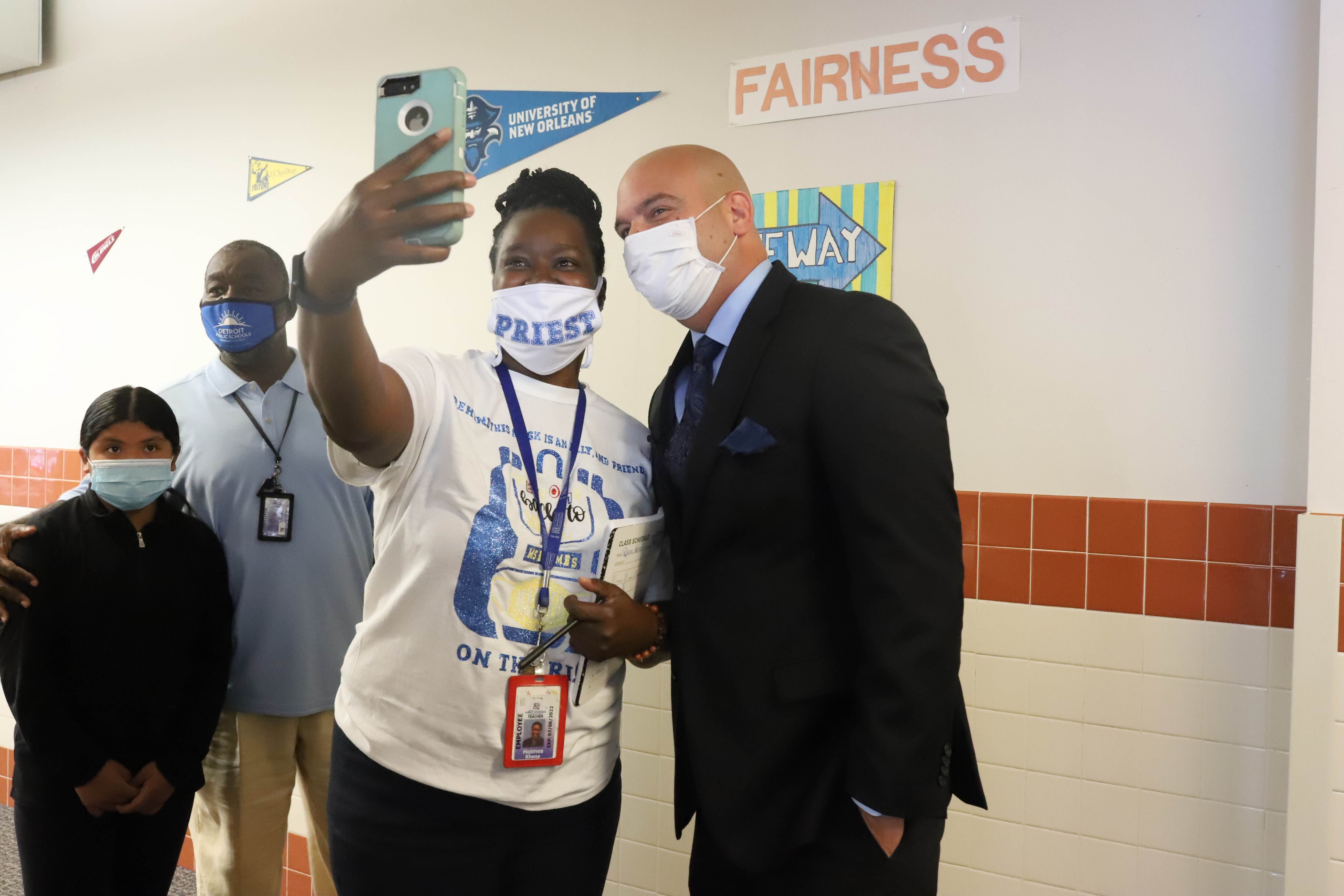The Detroit school district is investing heavily into weekly COVID testing for students and staff as a way to keep schools open. But will it be enough? Superintendent Nikolai Vitti said this week that inevitably, it may become necessary to require COVID vaccines for staff.
On Friday morning Vitti, who helms the Detroit Public Schools Community District, responded to questions from Chalkbeat about the possible mandate. He also discussed it Thursday morning in a CNN interview, hours before President Joe Biden called on states to mandate vaccines for K-12 school staff.
Nine states (California, Connecticut, Hawaii, Illinois, New Jersey, New Mexico, New York, Oregon, and Washington) as well as the District of Columbia and Puerto Rico, have vaccination requirements for school staff.
The district already is doing a significant amount of testing — spending $70 million of $1.2 billion this year in federal COVID relief money to test staff and students. The testing is required for staff and student athletes, but for all other students, parental consent is needed.
But no decision has been made about requiring vaccines for staff.
“We will continue to balance the positives and negatives of mandating the vaccine and collaboratively arrive at a decision that we believe is best for our students, employees, and the community,” Vitti said.
Terrence Martin, president of the Detroit Federation of Teachers — the largest employee union in the district — wasn’t immediately available for comment.
Benjamin Royal, a district teacher who has been active in calling for a shutdown of in-person learning, said “I’m certainly for mandating vaccinations. It’s a protective measure to keep kids healthy, and to keep staff healthy.”
But Royal, an active member of a vocal faction of the union, said the district shouldn’t stop with staff if Vitti decides to mandate vaccines.
“We’ve got to get to a point where it’s mandatory for students to be vaccinated too,” Royal said. “That’s the only way to maximize the protection to people in buildings.”
Currently, there is no vaccine for children under the age of 12.
Here are Vitti’s responses, via email, to questions about testing and vaccines:
Why is mandatory vaccination being considered in the district?
Because it is the most proven way to keep our employees safe, out of the hospital, and from dying. In addition, it is the most cost efficient and most operational efficient way to return to the old normal of schooling and keep our students in school where they learn and develop best. I’m not sure everyone will accept mask wearing, COVID testing, and quarantining over the long term. Lastly, without additional funding similar to COVID relief funding, the district will not be able to continue COVID testing after two years.
Is the idea of mandatory vaccination being negotiated with unions?
No, we are not currently negotiating this with the union. We have checked in with our unions about the idea of a mandate and as of the latest conversation they are not supportive. Keep in mind that we have been largely successful with our $500 incentive for employees to be vaccinated (72% are vaccinated). Most union leaders are still uncomfortable with requiring it.
Would the school board need to approve a vaccine mandate?
Legally, we can mandate it as a condition of employment absent a documented medical or religious exemption. Without that exemption, an employee could be terminated after being provided time to [vaccinate]. This is not something I would impose without the school board’s support regardless of whether I could do it without their vote. The school board and I have collaboratively worked through a series of difficult decisions over the years, most recently throughout the pandemic, and that needs to continue. We will continue to balance the positives and negatives of mandating the vaccine and collaboratively arrive at a decision that we believe is best for our students, employees, and the community.
What is driving the decision by districts to test students and staff?
I’m honestly not aware of other districts testing as we are. This is one reason why I believe our district is keeping our employees and students safer in the context of COVID. Testing assures everyone that asymptomatic cases are being detected and asymptomatic outbreaks are detected. I think it’s also necessary in light of general low vaccination rates in the city and an unavailable vaccine for students younger than 12. It also allows us to communicate an infection rate specific to the district and individual schools. Clearly, [district] infection rates (well below 1%) means our schools are safer than the social interactions in general society. Certainly there is a disruption to learning when we need to test employees and students at a school weekly but that disruption is minor compared to numerous cases, outbreaks, and quarantining where in person learning can be disrupted for 14 days.
What challenges have you faced in doing weekly testing?
The challenge is that we need families to consent to testing (completing the paperwork). We can mandate it for employees, which we have, but legally we cannot for students.






